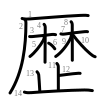Hello, you have come here looking for the meaning of the word
歴. In DICTIOUS you will not only get to know all the dictionary meanings for the word
歴, but we will also tell you about its etymology, its characteristics and you will know how to say
歴 in singular and plural. Everything you need to know about the word
歴 you have here. The definition of the word
歴 will help you to be more precise and correct when speaking or writing your texts. Knowing the definition of
歴, as well as those of other words, enriches your vocabulary and provides you with more and better linguistic resources.
Translingual
| Stroke order
|

|
Glyph origin
Variant of 歷, simplified from 歷 (秝 → 林).
The modern Japanese usage is of reform (shinjitai) nature.
Han character
歴 (Kangxi radical 77, 止+10, 14 strokes, cangjie input 一木木一 (MDDM), composition ⿸𠩵止)
Derived characters
See also
References
- Kangxi Dictionary: not present, would follow page 577, character 8
- Dai Kanwa Jiten: character 16334
- Hanyu Da Zidian (first edition): volume 2, page 1444, character 7
- Unihan data for U+6B74
Chinese
Japanese
Kanji
歴
(Fifth grade kyōiku kanji, shinjitai kanji, kyūjitai form 歷)
- take place, past, history
Readings
Compounds
